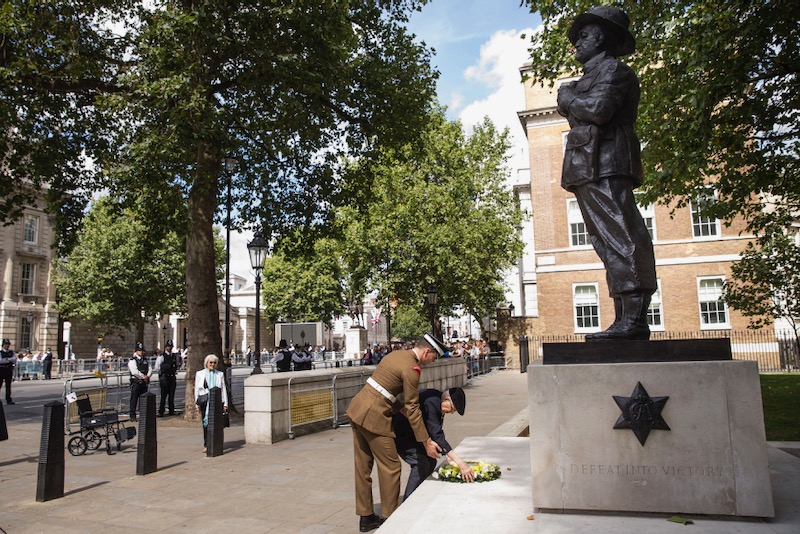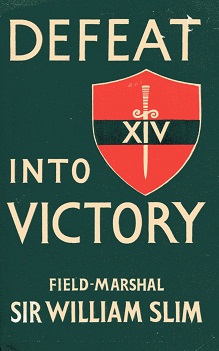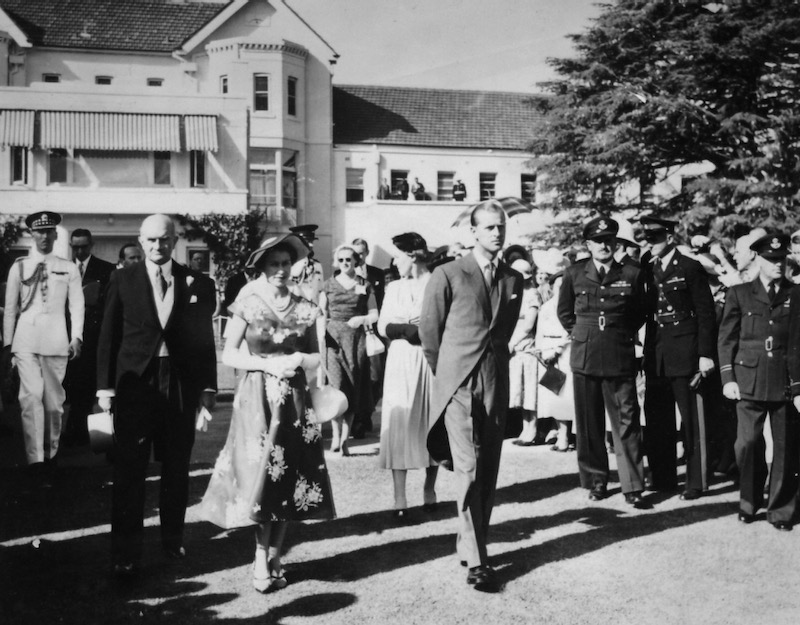Fifty years ago today, a very great general died – Field Marshal Lord (William) Slim, known to the troops as “Uncle Bill”. His statue stands in Whitehall outside the Ministry of Defence along with the two other greats of the Second World War, Montgomery and Alanbrooke. In the 360 years of the British Army’s continuous existence, however, with the possible exception of Louis de Duras, Earl of Feversham, a Huguenot in Catholic James II’s service, Slim is the only cradle-baptised Catholic to become its professional head.
My “connection” with the field marshal began at his funeral. In December 1970, I was a brand new second-lieutenant in the successor to the Border Regiment. On my commissioning course at Mons Officer Cadet School there’d been no time for military history, but I did know that there’d been two great generals in the Second World War (only later did I learn about Alanbrooke), and that one of them, Slim, had commanded XIV Army in Burma, known with wry pride to its members as the “Forgotten Army”. It certainly wasn’t forgotten in 1970, though. Not only did my posting order on commissioning come from Imphal Barracks, York – named after Slim’s finest victory against the Japanese – I was assigned to Chindit Company, where my fellow second-lieutenant was the son of Sir John Burgess, who’d commanded No 34 Column of the Chindits, the legendary long-range jungle fighters raised by Orde Wingate.
Resonant names, nevertheless, were about the extent of my knowledge of the Far East Campaign. Nor was there much chance to learn more, for 1970 proved a busy year with the troubles in Northern Ireland, on top of which in January we were due to go to the Jungle Warfare School in Malaysia. I was therefore looking forward to Christmas leave.
On 15 December, however, we received a warning order to prepare for ceremonial duties at Windsor. As one of the regiments whose antecedents had fought under Slim’s command, we were to have the honour of lining the route of the funeral cortege. Next day, a dozen fellow officers and I were marched into Gieves and Hawkes in Savile Row to be fitted for greatcoats (fortunately at Her Majesty’s expense), and the following three days were spent on the square at Colchester. Then on the Sunday we were bussed to Victoria Barracks, Windsor, for a dress rehearsal under the Scots Guards for Tuesday’s ceremony.
 Burma Star Veteran Richard De Renzy Channer salutes the statue of Field Marshal Slim (commander of the 14th Army in Burma) lays a wreath during commemorations in London to mark the 70th anniversary of VJ Day. (Pic: Dan Kitwood/PA)
Burma Star Veteran Richard De Renzy Channer salutes the statue of Field Marshal Slim (commander of the 14th Army in Burma) lays a wreath during commemorations in London to mark the 70th anniversary of VJ Day. (Pic: Dan Kitwood/PA)
I confess, though, that that evening I didn’t fully appreciate the honour, nor being woken by a piper in those dour barracks on a cold December Monday morning. And it was eating into Christmas leave. But taking post halfway up the hill to the castle on the Tuesday morning, I began to feel heartily ashamed of myself. The British Army, like Burke’s vision of society, is a partnership not only between those who are living, but between those who are living, those who are dead, and those who are yet to be born. The slow march of the approaching band of the Scots Guards left me in doubt that this was an historic moment. The gun carriage bearing the coffin passed just feet away, and I was glad we presented arms rather than resting on them reversed, for with my head lowered I’d have seen nothing of that memorable procession.
We returned to Colchester that evening and spent the 23rd “making and mending”. When I eventually got home to Yorkshire on Christmas Eve my father asked, “Have you read Defeat Into Victory?” I said I hadn’t, to which he replied, “Not only should you, you must.”
Three days later I had.
Defeat Into Victory is Slim’s epic tale of how a beaten army managed to withdraw the length of Burma in 1942 after the fall of Singapore, then turn to halt the Japanese on the Indian border and begin the slow pushback which culminated in the victory of the title – the liberation of Burma and Malaya in 1945. But it is not merely narrative history; rather is it a work of profound humanity, one in which it is difficult not to see the author’s formation in the Catholic faith. It speaks to the very essence of soldiering, and was for me transformative. When I decided to make soldiering a career rather than go back to theological college, I subsequently read Defeat Into Victory each time I was promoted.

But why, for a baptised Catholic, was the funeral being held at Windsor Castle and with the rites of the established Church? The answer is that as a Knight of the Garter, the field marshal was entitled to obsequies in St George’s Chapel. But, further, Slim had renounced – or at least abandoned – his Catholicism after his marriage in 1926 to the daughter of a Church of Scotland minister.
The marriage had been celebrated first at St Andrew’s Church in Bombay, and later at the Catholic church in Quetta, now Pakistan, where Slim was attending the staff college. According to his foremost biographer, the late Ronald Lewin, the second service was “little more than a formality”.
But this, to me, is a perilous claim. Lewin was a fine military historian, but as a posthumous biography, Slim: The Standardbearer could only of course examine the subject’s interior life through third parties and Slim’s own writing, which was largely on the soldier’s art. The latter included a good deal about the moral qualities required of a leader, but Slim was no Newman. His memoirs are no Apologia.
Slim’s origins are often described as “humble”. He was born in Bristol in 1891 into a comfortably-off family in the hardware business. His mother was a fervent Catholic who saw to it that he was educated and brought up in the faith, not least at St Philip's Grammar School, Edgbaston (founded by priests of the Birmingham Oratory), when the family moved there in his teens. Had it not been for the First World War the young William might have gone into trade too, but the rapidly expanding army needed officers and was prepared to look beyond the usual recruiting places. He had a “good war” on both the Western Front and Gallipoli – wounded and winning the Military Cross – and at its end was granted a regular commission, but not in the British Army – in its country cousin the Indian; in the Gurkhas, indeed. And in India he flourished.
But, says Lewin, his Catholic faith “had never penetrated his core” and that “manhood made him ask questions which the dogmas of his early indoctrination were unable to sustain.” In the aftermath of the Great War, Slim would not have been alone in this, but “Gently, but irrevocably,” adds Lewin “he lapsed.”
That “irrevocably” is troubling too. When Slim was at Quetta he formed a lifelong friendship with Dr Donald MacDonald, chaplain of the Cameronians, a regiment founded by Covenanters. After the field marshal’s death, MacDonald told Lewin of their conversations when he baptised the Slims’ first child, that Slim himself had become “dissatisfied with many RC tenets.” But MacDonald added that this seemed to him to be “more an intellectual aversion than a spiritual reformation.” Lewin goes on to conclude that he was “anima naturaliter Christiana, a man to whom belief came instinctively; but it was a belief uncomplicated by dogma.”
Yet, as Lewin also says, the deepest truths about a man’s inner life are often reflected in his preoccupations when death approaches. During his last years, the field marshal seemed increasingly troubled, so much so that some of those closest felt he needed spiritual advice. It emerged that he was pricked by a sense of guilt, that he’d broken his promise to his mother never to abandon his Catholic faith. “The point was,” says Lewin, “not that he was aching, with the emptiness of an apostate, for what he had rejected; the point was the pledge to his mother.”
But ultimately that can only be speculation. Louis de Duras, Earl of Feversham, the Huguenot son of a great Catholic family, who witnessed Charles II’s deathbed reception and later served as the Catholic dowager Queen Catherine’s chamberlain, is thought at the end to have been reconciled to his family faith. We simply do not know if the only other cradle-baptised Catholic to be head of the Army was also thus reconciled.
Be what may, among British officers today, Slim remains for his humanity alone the most admired of our generals.



 Loading ...
Loading ...
What do you think?
You can post as a subscriber user ...
User comments (0)